Apart from some user-friendly options, Google Chrome offers some experimental features known as Chrome Flags. It helps you try upcoming features in the stable version of Google Chrome. If you want to try some of them, do check out this list of the most useful Google Chrome Flag settings for Windows 11/10 users. These Chrome flags help you customize the user interface and enhance the features.
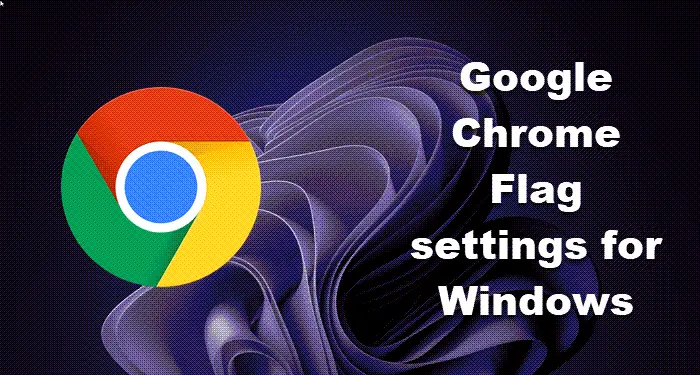
Google Chrome is one of the popular browsers for Windows PC, and the credit goes to its diverse set of features. Only a few people know that Chrome has some hidden experimental features which are primarily still in beta. You can try out these features if you like laying your hands on under-the-hood developments.
These empirical features include the functionalities being developed by Google and put in on Chrome for user feedback but not yet released for general availability. These features, when used in a cautious manner, can effectively improve your browsing experience. There are lots of amazing features for consumers to try out here. We’re going to list down the ten most useful and handy features you can enable using Chrome Flags. But before we jump on that front, let’s take a look at how to access Chrome Flags via its hidden configuration page.
How to access Chrome Flags
Before we get the ball rolling, it is important to note that these features are experimental which may behave differently at times. Quoting Google,
“We make absolutely no guarantees about what may happen if you turn one of these experiments on, and your browser may even spontaneously combust. Jokes aside, your browser may delete all your data, or your security and privacy could be compromised in unexpected ways.”
To overcome any sudden change in browser behavior, you can turn off all these experimental features by pressing the Reset all button.
Now, to access Chrome Flags, you simply need to put “chrome://flags” or “about://flags” in the address bar of your Chrome browser and hit Enter.
This will open up the Chrome Flags page, where you’ll see several experimental features listed. There is a short description below each experiment, along with the supported platforms. When you scroll down to the bottom, you can see some of the features listed under a section named Unavailable Experiments, which is probably because of the missing support for Windows OS.
To enable any feature, you need to click on the Enable button or select Enabled from the drop-down menu. Whenever you enable any setting, you’ll have to relaunch your browser for the changes to take effect.
Useful Chrome Flag settings
Some of the useful Chrome Flag settings are:
- Smooth Scrolling
- Auto Dark Mode for Web Contents
- Parallel downloading
- Password import
- Enable Reader Mode
- Touch UI Layout
- Pull-to-refresh gesture
- Omnibox switch to tab suggestions
- Side panel
- Global Media Controls Modern UI
To learn more about these Chrome flags, continue reading.
1] Smooth Scrolling
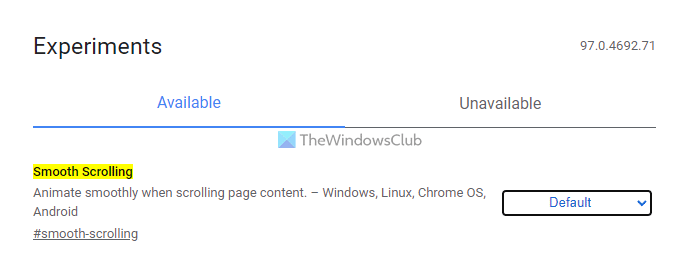
Smooth Scrolling Chrome flag helps you enable a better scrolling feature in the browser. If you have opened multiple tabs, you can certainly turn on this Chrome flag to get a better scrolling experience. It reduces the lag up to a point so that you can scroll through windows without any problem.
2] Auto Dark Mode for Web Contents
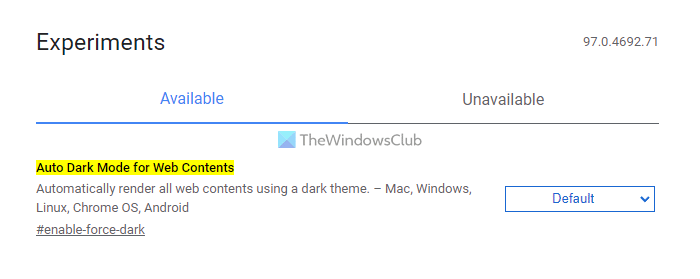
There are multiple ways to turn on dark mode in Google Chrome, and the best way is by using an extension. However, this Chrome flag helps you turn on the dark mode for all web pages. No matter which website you browse, you can find the dark mode across the web.
3] Parallel downloading
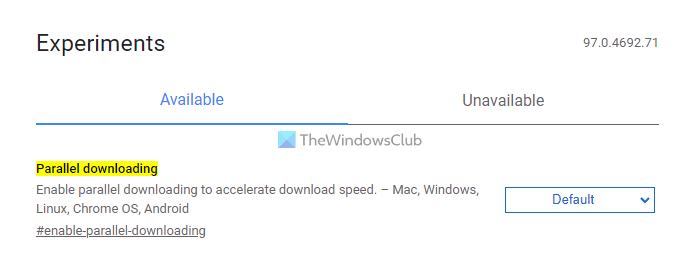
By default, Google Chrome prioritizes the download speed to the first file you started downloading. If you want to download multiple files simultaneously, it might be a problem for you. That is why you can enable this Chrome flag, which helps you download files parallelly.
4] Password import
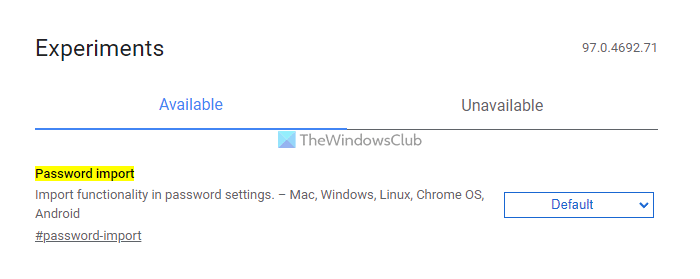
By default, Google Chrome doesn’t allow users to import passwords. However, if you turn on this Chrome flag, you can do that without any problem. Although it is an experimental feature, you can use this functionality without any lag or issue. However, you must have a valid password file to import.
5] Enable Reader Mode
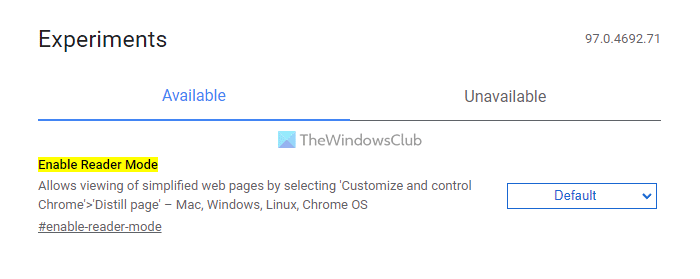
If you often read articles on the browser or start your day by reading news from various sources but often get distracted by annoying popups or advertisements, this Chrome flag might be handy for you. It turns on the reader mode so that you can read the original content on a webpage without any distractions.
6] Touch UI Layout
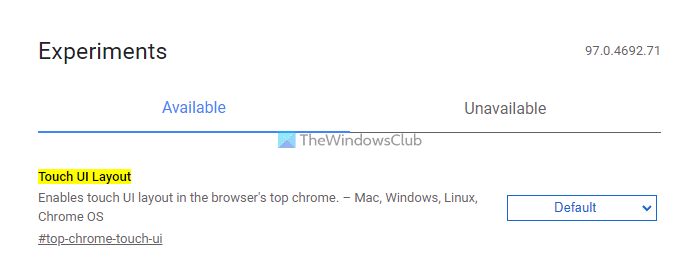
If you use Google Chrome on a touchscreen device, this Chrome flag will help you a lot. It is mainly for touch screen devices. In other words, you can find some space between two options; the user interface is much more optimized for touch screen Windows devices, etc.
7] Pull-to-refresh gesture
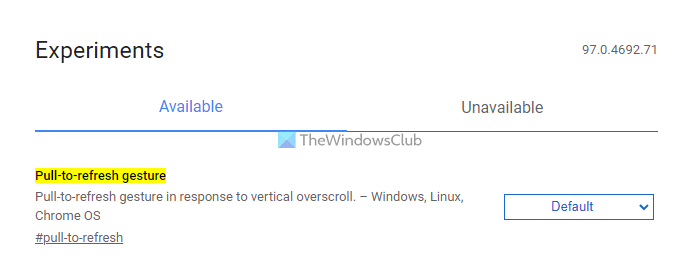
If you need to refresh a webpage, you can use the F5 key or the dedicated Refresh button in the browser. However, if you turn on this flag, you can refresh a webpage by pulling the screen from top to bottom. It will help you refresh the page within moments, although it is optimized for touch screen devices.
8] Omnibox switch to tab suggestions
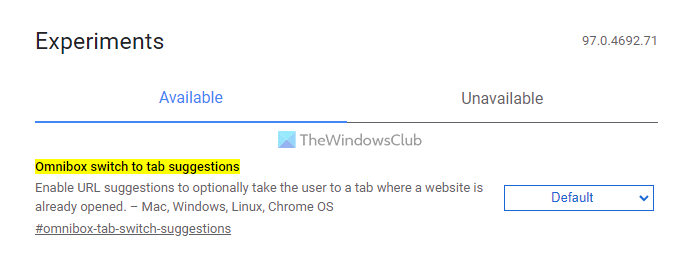
It helps you enable URL suggestions so that you can search for a keyword on a particular website, which is already opened on your browser. Instead of clicking on the search bar, you can turn on this Chrome flag to search for any keyword on that website quickly.
9] Side panel
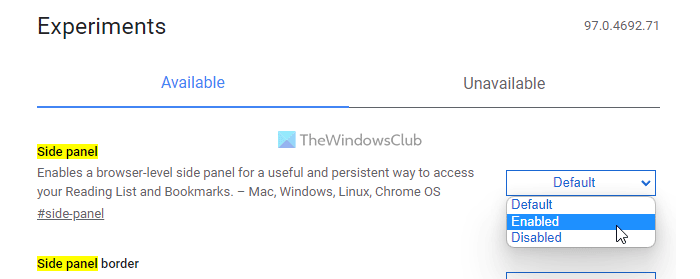
The Side panel flag helps you get a sidebar panel on the right side so that you can manage your reading list. Instead of clicking on the icon, you can use the sidebar panel to manage your reading list and bookmarks. It is quite handy when you have a big screen.
10] Global Media Controls Modern UI
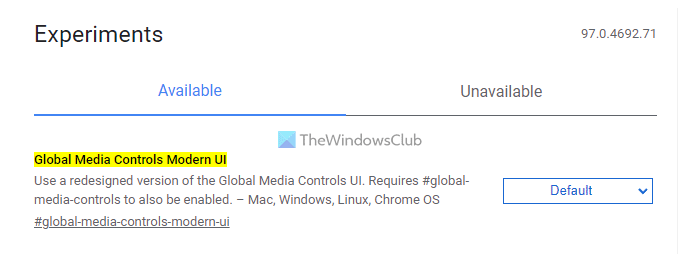
Google Chrome has an in-built global media control panel, which helps you play or pause the playing audio or video file. However, if you want to use the modern user interface instead of the traditional UI, you can turn on this Chrome flag. Similarly, if you do not like to use the modern UI, you can disable this Chrome flag.
What can I do with Chrome Flags?
Chrome flags are basically the experimental features that Google includes in the browser. Any user, even after being the Stable version user, can use these Chrome flags to test upcoming features. Google includes some beta features as flags that you can access from the chrome://flags window.
How do I get flags on Google Chrome?
To get flags on Google Chrome, you need to open the browser and enter chrome://flags in the address bar. It opens a panel where you can find all the latest Chrome flags in one window. Following that, you can turn on or enable any flag as per your requirements.
Read next:
- Chrome Flags tweaks for better user experience
- List of hidden Google Chrome URLs
Let us know your thoughts in the comment section below.
Hi,
I have a problem with Extension Toolbar Redesign for long time ago. I never switched it on, but it activated automatically and I can not switch it off. Even if I switch it off or on, new design is activated, which is pretty annoying, because new design is terrible. I hate that the hidden icons are on the top of the burger menu and not in the separate menu on the end of the toolbar (asi it was in the old design).
> When enabled, you can see some of the browser elements
> are redesigned with a slight touch of material design.
> Google is expected to launch it soon for general users.
UGH… I hope you can shut it OFF. MaterialDesign is an abomination on the face of UI design. Whomever came up with it should be forever banned from touching a computer or any sort of design tool ever again.
does anyone one have any tools like configfox to optimize chrome also…??